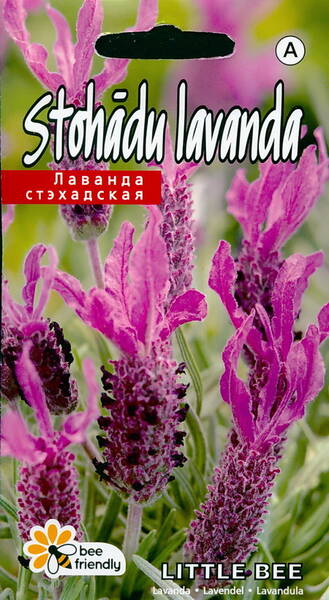Your shopping cart is empty!
French lavender "Little Bee" (Spanish or Italian lavender)
Lavandula stoechas ssp. pedunculata
2.41€
Ex Tax: 1.95€
Ex Tax: 1.95€
French lavender "Fragrant Butterfly" (Topped lavender) - Lavandula stoechas = Lavandula latifolia.
Incredibly beautiful flowers!
The flowers contain a fragrant essential oil. Perennial shrub with numerous shoots up to 90 cm high. Leaves are linear, silvery-greenish-gray, with delicate pubescence. The flowers are small, lilac-purple, collected in spike-shaped inflorescences of 6-10 flowers in whorls. Blooms the first year in August.
Origin: Southwestern Europe.
They are distinguished by unusually beautiful flowers that come in different shades of purple, lilac, pink, burgundy, green and white.
French lavender is also very fragrant, but its scent is not as refined as that of English lavender and its hybrids. It blooms earlier than other types of lavender, in April-May, flowering continues until July, at the end of summer the second phase of flowering may begin. The limit of cold resistance of French lavender is zones 6-7.
Agricultural technology.
The plant prefers a sunny place, dry, moderately fertile soils. Sowing for seedlings is carried out in the second half of January - February to a depth of 3 mm. 1.0 g = 950 seeds.
The landing container is placed for 30-40 days in a refrigerator at a temperature of +5°C. Seeds germinate in the light at a temperature of +15+21°C. When the seedlings grow up, they dive according to the 5x5 cm scheme. In May, the seedlings are planted in a permanent place.
Lavender seedlings should be planted so that between the plants there is a free space of 30-50 cm. There should not be more than five plants per square meter.
A suitable place for landing would be areas on a slope, in rubble, next to a stone wall. This is necessary so that the heated stones raise the temperature.
The month of May is best suited for planting a plant in a permanent place.
Annual shoots are used as cuttings, which are cut into cuttings up to 10 cm long. Then hilling is carried out, and the space between the stems is filled with earth. Over the summer, abundant shoots should grow, which will take root firmly in the ground. You can dig a bush in the fall, for its subsequent division. For effective vegetative propagation, cuttings of annual shoots are recommended.
Planting cuttings is carried out in greenhouses or cold greenhouses. Planting depth should be about 5 cm. Ordinary seedlings are planted in October or November.
Another reliable method of propagation of this plant is layering: the essence of which is to bend several shoots in the spring and put them in a groove about 5 cm deep (watering is necessary after the shoots fall asleep with earth). In the spring of next year, the shoot is cut off from the mother bush (after which it can already grow on its own).
Sowing seeds in a permanent place is usually done by the end of October: then new shoots appear towards the end of the next spring.
Application: on terraces, in gardens with fragrant herbs. Harvest lavender flowers as soon as they are fully open, at which time their color and scent are at their most intense. Flowers should be dried in a shaded and well-ventilated place.
Incredibly beautiful flowers!
The flowers contain a fragrant essential oil. Perennial shrub with numerous shoots up to 90 cm high. Leaves are linear, silvery-greenish-gray, with delicate pubescence. The flowers are small, lilac-purple, collected in spike-shaped inflorescences of 6-10 flowers in whorls. Blooms the first year in August.
Origin: Southwestern Europe.
They are distinguished by unusually beautiful flowers that come in different shades of purple, lilac, pink, burgundy, green and white.
French lavender is also very fragrant, but its scent is not as refined as that of English lavender and its hybrids. It blooms earlier than other types of lavender, in April-May, flowering continues until July, at the end of summer the second phase of flowering may begin. The limit of cold resistance of French lavender is zones 6-7.
Agricultural technology.
The plant prefers a sunny place, dry, moderately fertile soils. Sowing for seedlings is carried out in the second half of January - February to a depth of 3 mm. 1.0 g = 950 seeds.
The landing container is placed for 30-40 days in a refrigerator at a temperature of +5°C. Seeds germinate in the light at a temperature of +15+21°C. When the seedlings grow up, they dive according to the 5x5 cm scheme. In May, the seedlings are planted in a permanent place.
Lavender seedlings should be planted so that between the plants there is a free space of 30-50 cm. There should not be more than five plants per square meter.
A suitable place for landing would be areas on a slope, in rubble, next to a stone wall. This is necessary so that the heated stones raise the temperature.
The month of May is best suited for planting a plant in a permanent place.
Annual shoots are used as cuttings, which are cut into cuttings up to 10 cm long. Then hilling is carried out, and the space between the stems is filled with earth. Over the summer, abundant shoots should grow, which will take root firmly in the ground. You can dig a bush in the fall, for its subsequent division. For effective vegetative propagation, cuttings of annual shoots are recommended.
Planting cuttings is carried out in greenhouses or cold greenhouses. Planting depth should be about 5 cm. Ordinary seedlings are planted in October or November.
Another reliable method of propagation of this plant is layering: the essence of which is to bend several shoots in the spring and put them in a groove about 5 cm deep (watering is necessary after the shoots fall asleep with earth). In the spring of next year, the shoot is cut off from the mother bush (after which it can already grow on its own).
Sowing seeds in a permanent place is usually done by the end of October: then new shoots appear towards the end of the next spring.
Application: on terraces, in gardens with fragrant herbs. Harvest lavender flowers as soon as they are fully open, at which time their color and scent are at their most intense. Flowers should be dried in a shaded and well-ventilated place.
Spanish Lavander, Italian lavender, French lavender, Topped Lavender.












